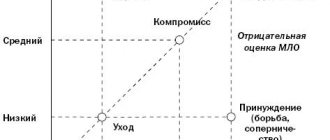Socionics identifies 16 personality types and all these types are divided into 4 dichotomies:
- Logic - ethics;
- Intuition - sensory;
- Rationality - irrationality;
- Extroversion - introversion.
With the help of these dichotomies, distinct characteristics of people are determined. The presented dichotomies are distributed across quadrants. Each quadra has its own atmosphere. For example, gullibility, a sense of humor and sexuality. Well, now, let's take a closer look at each personality type.
Why is socionics needed?
Types of conflicting personalities - what they are and their characteristics
The concept of socionics helps to better understand yourself and others, productively solve personal and professional problems, discover true talents and realize yourself in the right direction. Basic knowledge of personality prototypes also allows you to find common ground in controversial issues between family, friends, and strangers, and to accept your opponent’s worldview.
Interesting. If you correctly determine the sociotypes of people, it will not be difficult to predict their behavior in certain situations. Understanding the characteristics of sociotypes simplifies the selection of work teams. For individual tasks, it is worth selecting a candidate who can cope in the best possible way.
Using socionic tests, questionnaires and interviews
The test is one of the first methods used in socionics to determine a person’s psychotype. The task of the first socionic tests was to determine the four main dichotomies from the answers to just 4 questions - the Ovcharov-Megdel test. Subsequently, the structure of the tests changed, taking a tree-like form, and increased from 4 to 70 questions. The most famous Talanov test today is much more complex and takes into account most of the parameters known to socionics.
Such complex tests are called socionic questionnaires. The weak point of this method is considered to be the reliability of the results obtained. Numerous studies on this topic have shown that the accuracy of determining the socionic type based on a single attribute reached 80%. However, the overall reliability for a combination of properties did not exceed a rather unconvincing 36%. Experts believe that the main reason for such indicators is the inadequacy of the test taker’s self-esteem.
A socionic interview is conducted by one person or a group of specialists. During the interview, a number of questions are asked, the answers to which reveal the presence of qualities of a particular psychotype. In addition, the behavior and reaction to the questions of the person being interviewed is analyzed. A comprehensive analysis of the established characteristics allows us to establish with a high degree of accuracy the socionic type of a person, the weak and strong traits of his character, and give reasonable recommendations for solving a particular life problem.
Areas of use
Types of human temperament and their brief characteristics
Knowledge of the basics of socionics gives good returns in the following cases:
- Staffing classes and study groups. A harmonious combination of the temperamental characteristics of the types contributes to a friendly working atmosphere and automatic resolution of discipline problems.
- Subject-differentiated training in high school and university seminars, where the priority will be the “club”, discussion method of considering issues.
- Individual approach to students to provide opportunities for self-realization.
Knowledge of the types of people in socionics simplifies management consultations for organizations and contributes to the creation of a stable team of broad-spectrum employees and target groups for the implementation of specific tasks. Sociologically competent staff formation saves people’s money, time and nerves.
The best sociotypes in business
Pseudoscience makes an invaluable contribution to self-development and harmonization of relationships in the family and society. Perception of oneself, possible scenarios for the development of relationships helps to identify hidden mechanisms of quarrels, misunderstandings, and prevents the likelihood of irreparable mistakes.
History of the creation of the socionic test
Work on the creation of this socionic test lasted from 1997 to 2001. At that time, I worked as a computer science teacher at one of the Kyiv institutes and had the opportunity to attract a fairly large number of people to participate in the study - 420 people (21 groups with an average of 20 people each). 99% of them were not familiar with socionics, thanks to which the result can be considered objective.
At the first lesson, I gave students to fill out socionic tests and subsequently, by communicating and observing them throughout the course of study, I identified the compliance or inconsistency of the subjects’ behavior with the test results.
At the initial stage of the study, the test takers were asked to fill out various socionic tests. Later it was concluded that tests where you are required to choose one word from a pair give more accurate results than questionnaire tests, since, for example, to the question “Do you have strong logical and analytical thinking?”, the majority of respondents, regardless of TIM, answered a positive response.
The most accurate socionic test was A.V. Molodtsov’s test (36 pairs of words, 9 pairs for each dichotomy). But it also gave a significant error. In addition, when, for example, on the “ethics-logic” scale, the test taker chose 5 options characteristic of an ethicist and 4 for a logician, the result looked unconvincing.
To obtain a more accurate result, it was first decided to increase the number of words to 21 pairs for each dichotomy. However, this did not affect the result in any way: the proportion of answers “11/10” in the new test was the same as “5/4” in the previously used Molodtsov test.
As a solution, it was decided to select test forms completed by students whose test results were confirmed upon further observation, and, based on their choice of a particular word in each pair, calculate the relevance of the words.
The relevance value of each word ranged from 0.94 to 0.57. The final version of the test included the 7 most relevant word pairs for each dichotomy. This increased the accuracy of the test not only due to the greater total relevance of words, but also by reducing testing time, because When completing a large test, the subject gets tired, which reduces the accuracy of the result.
The results of using this test allowed us to draw the following conclusions:
- In 70% of cases, the test results and the results of subsequent typing completely coincided.
- In 5% of cases it was clearly evident that the test result was erroneous.
- In the remaining 25% of cases, the subjects showed signs of type distortion, as a result of which it was impossible to confirm or refute the test result with complete confidence.
- When a person who knows socionics fills out the test, the testing turns out to be biased, since he, if not consciously, then subconsciously tries to predict the result.
- A person who does not know socionics, carefully and objectively fills out the test, gets the correct result in 70% of cases.
- If a person's type is distorted, the likelihood of obtaining an accurate test result is greatly reduced.
- Only an experienced socionic expert can accurately determine the socionic type.
Vitaly Vorobyov. Any reprint without a link (for Internet sites - hyperlinks) to this page is prohibited.
How to determine your personality type
When studying psychosophy, many are interested in knowing the basic characteristics on the basis of which the personality typology is formed. Socionics requires the use of several methods for determining it. One method excludes the reliability of the result.
Various ways of obtaining information help determine the socionic personality type:
- Tests.
- Interview.
- Experiments. The method of determining a sociotype is implemented in special conditions by setting a real task for the person being typed. A person’s reactions, actions, and decisions determine the conclusion about the method of data processing.
- Observation. The object is the actions and reactions of the individual, and the person’s appearance (portrait resemblance) is taken into account.
- Studying the dossier based on documents, texts, eyewitness accounts, diaries, creative results, photos, video materials.
Observed manifestations of personalities are used for comparison with standards used to classify people's sociotypes.
Socionic diagnostic algorithm
Tatiana PROKOFIEVA,Marina KUZMINA
From a series of articles “Psychology of the New Era”, published in the supplement to the newspaper “September 1” - “School Psychologist”, 2001.
We invite you, dear readers, to get to know socionic types better. Let’s take four functions for description: two strong and two weak. This way we can see both the advantages and disadvantages of each type.
Intuitive-logical extroverts (ILE, Don Quixote) are born researchers and inventors. At the same time, they study not only what is useful, but “everything that is interesting,” starting from the theory of machines and mechanisms, to butterflies and caterpillars. Don’t feed them bread, let them read about something mysterious and enigmatic. ILEs strive to immediately apply the acquired knowledge in practice, but at the same time they are rarely interested in receiving real benefits from their discoveries. Thanks to intuition (channel 1) and logic (channel 2), representatives of this type are able to quickly sift through a huge amount of literature on a topic that interests them, as they say, to embrace the immensity and “cut a clearing” for those following them. Their theories and methods are sometimes extraordinary in nature, which can lead to a revolution in already established views.
The main disadvantage of ILEs can be called their eternal desire to defend their ideals (the volitional sensory system is lame). Decency is the quality that ILEs idealize most. However, with inflated demands, it is very difficult for them to accept the lives and actions of people as they really are. Intransigence in the infringement of honor, dignity and freedom often pushes them into numerous “duels.” Sometimes they fight not with true enemies, but with windmills that operate only in their imagination. With the next insight, ILEs strive to share their thoughts with everyone around them, without even thinking, this corresponds to the moment and situation (weak function of ethics of relations). Unfortunately, they are not always able to listen to their interlocutor or opponent to the end, but interrupt them mid-sentence. For this they are sometimes called excessive upstarts.
Detailed description of ILE.
The sensory-ethical introvert (SEI, Dumas) can be called a master of compromise. SEI's life credo is the ability to fully enjoy life and not interfere with others doing so. As a rule, representatives of this personality type have an extremely comfortable home in which they like to relax their soul and body (sensory perception is a basic function). There are many convenient things in the house. Everything is matched to the tone and thought out in advance. SEI spends his free time cooking - this is his favorite pastime. A representative of this type is a born designer, hairdresser and makeup artist. He has a keen sense of color, shape and volume of objects. Gathering friends at the dinner table, SEI often becomes the toastmaster, joker and soul of the party (the ethics of emotions are in the creative channel). With a funny story or tale, he is able to win over even the most gloomy person.
The disadvantage of SES is the lack of ability to make important, strategic decisions. He does not have tenacity, perseverance and foresight in responsible matters. SEI lives one day at a time, any conclusions for the future are especially painful for him (intuition of time and logic of actions are weak functions). Another negative trait has been repeatedly noticed in representatives of this type - they spend a lot of precious time on trifles.
Detailed description of SEI.
Ethical-sensory extroverts (ESE, Hugo) are incorrigible optimists who try in everything and always to maintain presence of mind and good mood in any weather. These are true lovers of life, inclined to see the good in the bad. Representatives of this type love to eat delicious food and have a nice drink with friends in the lap of nature. They are often passionate about ideas. Unlike other personality types, ESEs are able to spend hours on the phone discussing the weather, business, and TV shows, or discussing other people’s problems. ESE is a lover of life and an optimist; he cannot stand despondency and inaction. They can provoke even the most gloomy and unsociable person to go mushroom picking. The joy of life is their main principle. ESE find themselves in the advertising business, they can “sell” the slowest-selling product or “spud” a picky buyer. At the same time, they often trade not for the sake of money, but for the sake of principle.
The disadvantage of ESE is the lack of accuracy. They are capable of being late and not doing what they promised on time, not at all because they didn’t want to, but because it is difficult for them to adequately make their plans. The weak function of logic does not allow representatives of this type to separate the main from the secondary. For him, all matters are equally important. As a result, scatteredness arises and important matters are left to chance. The weak function of intuition of time is expressed in the inability to foresee the future. To “crank out” the next little deal, ESE makes endless inquiries and makes numerous acquaintances. Sometimes irrepressible energy is spent on trifles, and when it comes to the main thing, there is no longer any strength or patience left to see it through to the end.
Detailed description of ESE.
The logical-intuitive introvert (LII, Robespierre) strives to see and create a system and pattern in everything. As a rule, these are widely erudite people who do not like to advertise their diverse knowledge. They are neat and pedantic not only in their way of thinking, but also in the external world around them. Among the LII, you are unlikely to meet a person who believes in miracles and hopes for “maybe.” Having identified a goal, they rely on their own hard work and organization in their affairs. Consistency, commitment, following a word once given - these are the good epithets that can be used to characterize representatives of this personality type.
The disadvantage of LII is the weakness of the ethics of relationships, which sometimes results in uncertainty and melancholy in people’s emotional assessments. This is especially noticeable in an unfamiliar environment. Looking at those around them, PIIs try to understand what is convenient, accepted in a given company, and what is not. However, they are not always able to adapt to the situation. They can be inappropriately cheerful or gloomy. Due to the lack of the ability to distinguish between emotional nuances, representatives of this type see people in black and white: bad - good, kind - evil, friend - enemy. LIIs are often characterized as stubborn and stubborn (hypertrophied volitional sensory function). The fact is that they cannot stand even the slightest falsehood and lies. In matters of fundamental importance to themselves, they can be overly solid, like a rock.
Detailed description of PII.
An ethical-intuitive extrovert (EIE, Hamlet) can be characterized as a person of wasteful emotions. It’s not for nothing that there are many artists, directors and musicians among them (the ethics of emotions in Channel One). “The whole world is a theater, and the people in it are actors” is the motto of EIE. He is able to present even uninteresting material to the audience in a surprisingly lively and entertaining way. In general, there is never a dull moment with them. Representatives of this type live from one emotional storm, which began unexpectedly, like a May thunderstorm, to another. He is a master at weaving quotes, jokes, puns and anecdotes into conversations. Often EIE is a true connoisseur and connoisseur of beauty. The intuition of time makes it possible to evaluate art and immediately determine what will be popular and what will not. Among representatives of this type there are many adherents of avant-garde movements in literature, music and painting. EIE is a bohemian man, sensitive to the mood of the era. These are the most aristocratic people, real princes and princesses.
The disadvantage of EIE is that it “works for the public.” Indifference and indifference to their posturing and external effects is sometimes too destructive. Not finding a suitable audience, EIE's enthusiasm fades, behavior becomes constrained and resentment towards listeners appears. They are distinguished by excessive disgust (the sensory system of sensations is lame). But even despite this, the home of a representative of this type is usually kept in “artistic disorder.” Contradictions can also appear in appearance. EIE is able to wear green and red, explaining this with fashion and a unique style. A painful inability to follow logic (this function is a pain point) sometimes hypertrophies into an emphasized desire to be known as a business person. EIE has a lot of notebooks, business cards and checks in his pockets. He presents them in all appropriate cases. A representative of this type cannot stand physical pain. Dentists are their sworn enemies. The slightest scratch can unsettle them for a long time, and a rich imagination ascribes to it the most dire consequences. Remember “The Princess and the Pea” - this is exactly the case.
Detailed description of EIE.
Logical-sensory introverts (LSI, Maxim) prefer to act quietly, systematically and rationally. In their view, the world is organized according to the law of logic (the corresponding function is basic). These people respect discipline and order. They are adherents of strong power. The brightest representative of this type of personality can be called I.V. Stalin. In his politics, he preferred to act secretly, sometimes through intrigue, and eliminated competitors without “noise and dust.” The perseverance and patience of PWDs are envied by many personality types who do not possess these qualities. They retreat seeing the quiet but determined stance of the LSI. Logical-sensory introverts are leaders of a small team; they will cope with the assigned business or study task accurately and on time.
PWDs are often accused of being emotionally deaf. Their disadvantage is the weak manifestation of the ethics of emotions. For example, they are rarely able to sense the mood prevailing in the team under their supervision. They prefer to build relationships with people on the effect of adoration. Representatives of this type are rarely able to listen, and most importantly, accept even constructive criticism addressed to them. Their weakness in intuition of possibilities manifests itself in the fact that they tend to struggle with “excessive” information and try to adhere to one previously accepted opinion. Discussions and debates seem to them to be unnecessary bickering that interferes with work. PWDs rarely listen to advice because they consider their own point of view to be the only correct one. If you correctly point out these shortcomings to them, then they are able to harbor a grudge and, if necessary, take revenge. Just remember the Stalinist repressions, as a result of which dissident representatives of the intelligentsia were physically destroyed.
Detailed description of PWD.
An intuitive-ethical introvert (IEI, Yesenin) can be described as a visionary and a dreamer. Memories of the future and thoughts about the past occupy IEI’s thoughts. Representatives of this type like to lie on the sofa with a book in their hands or go out of town and reunite with nature. True, nature is an insidious thing; it can present disasters in the form of snow, rain and wind. Therefore, IEI mainly conducts such events in its own imagination. Strong intuition of time (first channel) gives this type a penchant for mysticism and superstition. IEI believe in prophetic dreams and omens. The ethics of emotions (creative function) helps them adapt to the invisible feelings of the interlocutor, to grasp the subtle aspirations of someone else's soul.
Unfortunately, people are not always able to use their creative function for good. Sometimes there are IEIs with hypertrophied ethics of emotions, in other words, emotionally dissolute. Instead of warming with inner warmth, they begin to manipulate people and become capricious. In an exalted impulse, the IEI can throw a hysteria, because “everything is wrong” and “nothing is adding up” (sensory perception and logic of actions are weak functions). In a word, a representative of this type is not created for difficulties. Under the influence of the intuition of time, he is able to get bogged down in a world of illusions, dreams and fantasies. He is unlikely to bring a long-term business to its logical conclusion. IEIs can spend years renovating an apartment or, having started rearranging furniture in the morning, give up this activity by lunchtime.
Detailed description of the IEI.
Sensory-logical extroverts (SLE, Zhukov) do not have their head in the clouds and do not lie on the couch dreaming about what would happen if... These are people of earthly, practical affairs. Ambitious, strong-willed and purposeful - this is how representatives of this type can be characterized. They are born leaders and administrators who are able to take responsibility for making important decisions. They value logic and argumentation. The irrationality of SLE is manifested in the fact that their activities are sometimes subject to mood. If they haven’t gotten up “on their left foot” in the morning, then they are capable of signing any piece of paper or giving the coveted C grade to an inveterate truant, but if not, beware! They say about such people: they are tough to kill. Despite this, if you turn to representatives of this type for help in a critical situation, they will not rant and give free advice, but will prefer to help with action. This is their main advantage.
Disadvantages include the inability to foresee the future and the consequences of harsh words and actions (weak intuition of possibilities). As a result, it seems to them that problems come out of nowhere and grow like a snowball. They see their main task as being able to withstand and not break. SLEs are also unable to understand the intricacies of human relationships. Strong-willed sensory in this case, as it were, wedges weak functions and from the outside a “tank effect” is created. Like a battering ram, they go straight through people's opinions and weaknesses.
Detailed description of SLE.
Sensory-ethical extroverts (SEE, Napoleon) are born leaders and leaders. Their area of interest: earthly, practical matters through which they can feel their boundless influence on others. Representatives of this type respect power and strive for it, and for one thing, for all the privileges bestowed by it. Their motto is “I came, I saw, I conquered”! These are strong-willed people (volitional sensory is a basic function) and at the same time diplomatic (ethics of relationships in the creative channel). While other types of information metabolism are characterized by hesitation and hesitation before embarking on a responsible event, SEEs rush headlong into the pool. “The main thing is to get involved in battle, and then we’ll see,” said Napoleon Bonaparte, a prominent representative of this type. “And I throw myself headlong into love, like into a pool,” echoes Alla Pugacheva, also a prominent representative of SEE. These are people of unbridled passions, if they are friends, then to the end, and if they love, then without a trace. They live in the present, for them the future is always wonderful, but it is in the future, and there is nothing to regret about the past, it cannot be returned.
The disadvantage of SEE is their desire to shine for everyone and everywhere like the Sun. The fourth channel (painful function) is occupied with the logic of relationships, they are not friends with the computer, they do not like various formalities: diagrams, schedules, they hate putting things in order. Hence their maximalism. Feelings of “love - hate” towards the same person can change several times a day. SEE often puts on the mask of a skilled manipulator and schemer, but due to the fact that intuition of possibilities is clearly not his strong point, quick victories sometimes turn into problems and defeats in the future. SEE hide failures from prying eyes, since nothing should disturb the image of the winner. SEE is often accused of egocentrism, inflated ambitions and conceit. Representatives of this type live one day at a time, according to the “here and now” principle, and with outbursts of anger, sometimes make enemies for themselves.
Detailed description of SEE.
The intuitive-logical introvert (ILI, Balzac) can be called the main strategist of all strategists. The most powerful intuition, combined with logic, gives representatives of this type wisdom and knowledge of the laws of life. The hallmark of ILI is caution. A prominent representative of this type of information metabolism is M. I. Kutuzov. He fought all his life, but did not win a single significant battle, all his victories were ambiguous - with a draw. Despite this, we call him the greatest commander. And Napoleon and Suvorov called Mikhail Illarionovich nothing less than a sly fox. Why? Kutuzov's intelligence was manifested in the simple recognition of an obvious fact - it was impossible to defeat Napoleon in open battle. Napoleon was a master of attack, he thought through battle plans in advance and in detail, and Kutuzov knew how to retreat. This is the most difficult military task - acting with only part of the forces, it is necessary to restrain all the enemy’s forces, constantly alternating, either deploying them into a battle formation, or turning them into a marching one. Kutuzov accurately calculated that Napoleon would not be able to provide food for the cavalry horses, and he was right. At the end of the war, only 5,000 people remained alive from the great “Grand Army”. This is from five hundred or six hundred thousand! Kutuzov retained half of the army for a general battle.
The main disadvantage of ILI can be called a painful inability to actively show emotions. Just remember the historical fact of Kutuzov eating chicken at the height of the Battle of Borodino. Representatives of this type often give the impression of gloomy and sad people. However, under the mask of eternal skeptics and pessimists hides a true dreamer and idealist. In order not to seem like a “mean knight” OR capable of extravagance or reckless actions. For example, giving an expensive gift to someone you don’t know well. But even here they rarely spend all the money until the end; they rather calculate in advance how much they need to spend and when to call it a day. Weak sensory perception manifests itself in indifference to appearance, sometimes reaching the point of laxity and sloppiness. In general, they gravitate towards a simple style of clothing.
Detailed description of OR.
Logical-intuitive extroverts (LIE, Jack London) are born entrepreneurs, businessmen, and innovators. All of them can be described in one word – hard workers. However, they do not like meaningless activities; everything must have an end goal. The head of the LIE resembles a computer (a strong logic channel). They are able to quickly grasp the essence of the problem, calculate the details and calculate the optimal ways to solve the problem (manifestations of intuition). At the same time, representatives of this type are incorrigible romantics, prone to travel, adventure and risk. Among them there are many stuntmen, rescuers, and testers. They work easily and cheerfully; a sense of community and camaraderie is important to them.
The main problem of LIE is its appearance (sensory perception is poor). Therefore, they often look as if they have just come from a hike: the men are not shaved, the women are not combed. They have so many important things to do that they have absolutely no time to take care of themselves. The same applies to the problem of cooking. In the kitchen, representatives of this type do not like improvisation. Rather, they will take a cookbook and prepare a dish according to the written recipe. When asked a routine question about health, they may begin to describe dubious symptoms that they have recently experienced. A peculiar spontaneity in the manifestation of emotions (weak ethics of emotions) is comparable to an unexpectedly collapsed waterfall. At such moments there are “too many of them for others.”
Detailed description of LIE.
An ethical-sensory introvert (ESI, Dreiser) is a true stoic and guardian of the moral principles of society. Among representatives of this type there are many lawyers, investigators, doctors and educators (ethics of relations in the first channel). ESI women are distinguished by their deep attachment to family. Having shouldered an unbearable burden in the form of work, housekeeping and children, they do not complain about fate, but heroically endure the hardships. In terms of the degree of dedication and reliability, no other psychological type can compare with ESI (volitional sensory - creative function). The ESI type knows how to be a healer not only of the spirit, but also of the body. The fight against evil is a distinctive feature of this type.
The disadvantage of ESI lies in the hyper-rationality of this type. A certain orthodoxy and maximalism negatively distinguishes them. Let us recall numerous ancient Greek stories. What should the main character choose: love or duty? ESIs choose the latter. Making such a choice, they often become hostage to internal loneliness. Interesting people and relationships that do not fit into their value system fall out of their sight. Representatives of this type are at odds with the intuition of possibilities, and therefore are capable of showing untimely or inappropriate initiative. Subsequently, this turns into numerous troubles - “the initiative is punishable.”
Detailed description of ESI.
The logical-sensory extrovert (LSE, Stirlitz) is distinguished by the ability to separate the main from the secondary. Like all logicians, this type does not tolerate haste, fuss and the accompanying nervousness. LSE are businesslike, collected, consistent. In general, representatives of this type sensibly assess their own strengths, so they strive to occupy a niche that suits them in their work. Sensory senses in the creative channel give LSE refined taste and the ability to create beauty with his own hands. LSE women prefer eye-catching, figure-suiting styles and accessories in clothing. Beauty combined with functionality and usefulness is the key to their success.
A disadvantage of FELs is their excessive tendency towards predictability and stability (weak intuition of time). For their fear of living one day at a time, they are reproached for conservatism and short-sightedness. Weak ethics of emotions gives uncertainty in an unfamiliar environment. Despite the fact that LSEs are extroverts, they are not inclined to start new relationships, guided by the principle “an old friend is better than two new ones.” Even if family life is not satisfactory for some reason, LSE is unlikely to embark on a lonely voyage.
Detailed description of FEL.
For an ethical-intuitive introvert (EII, Dostoevsky), issues of human ethics and morality come first in the hierarchy of priorities (ethics of relationships is a basic function). All his work is filled with the search for new, more perfect forms of human relationships. EII tries to be attentive to each individual, since he sees it as a whole world, a vessel in which, along with beauty, rudeness, anger and hatred are contained. The EII type is a spiritual and moral shepherd, a mentor, regardless of age. People rush to him to “cry into their vest” when grief happens or cats scratch at their souls. Making the path from understanding to forgiveness, the EII representative fulfills his destiny.
The disadvantages of the EII type include insufficient manifestation of volitional sensory skills, expressed in intransigence to violence against the individual. Moreover, their favorite expressions are all the epithets of “should”. The result is unnecessary fuss where there shouldn't be any. Spending days on end in philosophical reflections, which sometimes have no concrete, earthly application, EII is not able to organize his own life. External force pressure is detrimental to a vulnerable EII, unable to withstand the onslaught. Representatives of this type defend high, spiritual ideals, while rejecting and criticizing “philistine” manifestations: the desire to dress well, eat deliciously. EII sacrifice can sometimes be directed at those who do not really need it.
Detailed description of EII.
Vivid quotes from a representative of the type based on the results of using the projective technique “You have become a king in the magic kingdom”
Sensory-logical introverts (SLI, Gaben) are people who prefer to have a bird in their hands than to spend years catching a pie in the sky. A strong sensory function gives the SLI talent in everything related to working with his hands. A distinctive feature of this type is the arrangement of their own life. These people know a lot about design, furniture and have excellent taste. They prefer expensive clothes that emphasize their respectable status. And their status is really high. Both men and women are capable of organizing a profitable business in trade or production. SLIs are also natural cooks. The process of cooking for them is akin to a sacred rite. A strong sensory function helps them in this. And even if they don’t have a villa in the Canary Islands, but have a small house in the nearest Moscow region, believe me, they will be able to enjoy the delights of a morning jog in the dew, the smell of blooming lilacs and a mug of fresh milk.
The disadvantage of SLI lies in the weak functions of the ethics of emotions and intuition of time. Like ILI, SLI has difficulty expressing feelings and emotions. Latently afraid of being misunderstood (SLI are very vulnerable), he prefers not to demonstrate his true attitude towards people at all. However, if they are humiliated or publicly ridiculed, they can burst into tears and break down, shouting at the offender. Representatives of this type remember even minor grievances, and after major disagreements they are able to completely break off relationships for the rest of their lives. SLI's weak intuition of time manifests itself in the desire to plan all sorts of things in advance. This includes their excessive conservatism and caution. They will never make a final decision without fully understanding the issue and taking into account all the details.
Detailed description of SLI.
Intuitive-ethical extroverts (IEE, Huxley) are born psychologists, consultants and mediators. Representatives of this type are the most lively, spontaneous people of all. Intuition in the first channel gives them the opportunity to immediately grasp the essence of human problems and desires. They think in a non-trivial, unusual way and sometimes discover unknown virtues and talents in their interlocutor. Among the IEE there are many inventors and pioneers in the field of computer programs and technology. Intuition combined with ethics manifests itself in a precious sense of tact. I would like to say separately about IEE’s talent in working with people. All representatives of this type are immediately charming, warm and attentive. They have many diverse friends and at the same time everyone loves them for their subtle understanding of human problems and characteristics. If you meet a person on your way who is capable of maintaining good relationships with ex-wives, husbands and work colleagues, then this is most likely an IEE.
The disadvantage of IEE can be called the inability to do work that requires painstaking, systematic work, in a word, any “sedentary work”. Representatives of this type take a long time to submit their thesis, quarterly reports, and any other important documentation (they lack the manifestation of volitional sensory skills). Peacefulness and friendliness sometimes plays a cruel joke in the life of IEE. True, sometimes (most often inappropriately) they are able to show an iron will and determination to go to the end. But then they regret harsh words and actions and look for opportunities for reconciliation.
Detailed description of the IEE.
Photo gallery of types
Bibliography:
A. Barsova. How to live your own life, not someone else’s, or personality typology. – M.: “AST-press”, 2001.
S. E. Kashnitsky. Among people. Socionics is the science of communication. – M.: “Armada-press”, 2001
Social commentary Cackle
Personality type compatibility
The compatibility table will show a complete picture of the relationships between sociotypes.
Determining the compatibility of sociotypes
| Psychotype of personality | 1 | 2 | 3 | 4 | 5 | 6 | 7 | 8 | 9 | 10 | 11 | 12 | 13 | 14 | 15 | 16 |
| 1 | T | D | A | Z | P | R | D | M | se | pp | kt | K | P | R | ro | P.D. |
| 2 | D | T | Z | A | R | P | M | D | pp | se | K | kt | R | P | P.D. | ro |
| 3 | A | Z | T | D | ro | pd | P | R | kt | K | se | pp | d | M | p | r |
| 4 | Z | A | D | T | pd | ro | r | P | K | kt | pp | se | M | d | r | p |
| 5 | P | R | ro | pd | T | D | A | Z | p | r | d | M | se | pp | kt | K |
| 6 | R | P | pd | ro | D | T | Z | A | r | p | M | d | pp | se | K | kt |
| 7 | d | M | r | r | A | Z | T | D | ro | P.D. | P | R | kt | K | se | pp |
| 8 | M | D | r | p | Z | A | D | T | P.D. | ro | R | P | K | kt | pp | se |
| 9 | se | pp | kt | K | P | R | ro | pd | T | D | A | Z | p | r | d | M |
| 10 | pp | se | K | kt | R | P | pd | ro | D | T | Z | A | r | p | M | d |
| 11 | kt | K | se | pp | d | M | p | r | A | Z | T | D | ro | pd | P | R |
| 12 | K | kt | pp | se | M | d | r | p | Z | A | D | T | pd | ro | R | P |
| 13 | p | r | d | M | se | pp | kt | K | P | R | ro | pd | T | D | A | Z |
| 14 | r | p | M | d | pp | se | K | kt | R | P | pd | ro | D | T | Z | A |
| 15 | ro | pd | P | R | kt | K | se | pp | d | M | p | r | A | Z | T | D |
| 16 | pd | ro | R | P | K | kt | pp | se | M | d | r | p | Z | A | D | T |
Explanation of the abbreviation:
- D – relationships are built on a harmonious complement;
- PD – semicomplement;
- A – activity of partners;
- M – relaxation relations;
- pp – complete opposite;
- Z – mirroring of feelings;
- K – conflicts are traced;
- T – people of the same type;
- Ro – direct relationship;
- se – cool relationship with inner sympathy for each other;
- d – business approach;
- kt – complete misunderstanding of each other;
- audit method of building relationships (R – psychotype – auditor, r – partner in the role of auditor);
- relationships of patronage in the absence of feedback (P – psychotype in the role of customer, p – sociotype – receiver or sub-orderer).
Digital values correspond to the sociotype of the individual:
- 1 – Don Quixote;
- 2 – Dumas;
- 3 – Hugo;
- 4 – Robespierre;
- 5 – Hamlet;
- 6 – Gorky;
- 7 – Zhukov;
- 8 – Yesenin;
- 9 – Napoleon;
- 10 – Balzac;
- 11 – London;
- 12 – Dreiser;
- 13 – Stirlitz;
- 14 – Dostoevsky;
- 15 – Huxley;
- 16 – Gaben.
Harmony in relationships
Socionics rating
| Typing | Name | One of the typings |
| 185 | Alexey R. | Most often, I like to philosophize myself rather than rely on someone else’s existing reasoning (although... |
| 149 | Grey )) | Private furniture production in my city. Huge competition due to the abundance of small entrepreneurs... |
| 70 | Philip P. | Man creates his own life. Probably, it’s just that this is the most relevant for me at the moment…. |
| 60 | Evgeniy B. | Some of the people will float to Mars, but their colony will depend on the Earth. The Muslim East is political... |
| 41 | Anna Kruchinina | To be honest, the question is not entirely clear to me... The structure of production (in telecom, for example) is... |
Criticism of socionics
Scientific critics deprive socionics of attention, not wanting to play Captain Obvious. Many perceive the absence of negativity as approval and consider psychosocial teachings to be science.
The description of psychotypes in socionics is based on the autonomous energy model of the G-type psyche. Classification of personalities occurs from the point of view of “pure prototypes”. In reality, the behavior of sixteen TYPES is influenced by the subtype and character accentuations, which are formed depending on the surrounding reality.
Modern psychological theory
A person’s desire to be fulfilled in various types of activities is considered the main criterion of his life. Attempts to establish and define the basic laws of human interaction have been made since ancient times and continue to develop at the present time. Based on Freud's theory "On the structure of the psyche", Jung created a gradation of personality types.
His concept served as a typology of personality called “socionics” - the doctrine of the interaction between a person and the outside world based on:
- analysis using computer science;
- sociology;
- psychology.
It has become widely used in diagnostics and psychological consultations to determine personality type.
Select the city closest to you
Moscow
St. Petersburg
Aachen Abakan Aban Avimor Alma-Ata Almaty Alushta Amsterdam Anapa Antalya Apsheronsk Armavir Arkhangelsk Astana Astrakhan Athens Baku Balakovo Balashikha Balashov Bangkok Baranovichi Barnaul Barcelona Belgorod Belombre Berdsk Biysk Blagoveshchensk Blagoveshchensk (Amur region) Borisogleb SK Bratsk Brno Bryansk Budapest Budennovsk Burgas Bushtyna Varna Vienna Vidnoye Vitebsk Vladivostok Vladikavkaz Vladimir Volgograd Volgodonsk Volzhsky Vologda Volchikha Voronezh Voskresensk Votkinsk Gelendzhik Georgievsk Gomel Goryachy Klyuch Denver Jacksonville Dinskaya Dmitrov Dnepropetrovsk Dolgoprudny Domodedovo Donetsk Dorogobuzh Dresden Yekaterinburg Essentuki Zheleznogorsk Zheleznodorozhny Zhi Tomir Zhukovsky Zaporozhye Zvenigorodka Zelenograd Zimovniki Ivanovo Jerusalem Izhevsk Irkutsk Yoshkar-Ola Kazan Kalach-na -Don Kaliningrad Kaluga Kamensk-Uralsky Kandalaksha Kemerovo Kerch Kiev Kineshma Kirov Kirovograd Chisinau Klimovsk Kovrov Kolomna Komsomolsk-on-Amur Korolev Kostanay Kotka Krasnoarmeysk Krasnogorsk Krasnodar Krasnoyarsk Kremenchug Krivoy Rog Kuznetsk Kurgan Kursk Lazarevskoye Leninsk-Kuznetsky Lesnoy Liman Lipetsk Lisichansk Liski Lobnya London Lugansk Lutsk Lviv Lyubertsy Magnitogorsk Manchester Manganese Morocco Marseille Makhachkala Megion Melitopol Menzelinsk Miass Millerovo Mineral Waters Minsk Minusinsk Mogilev Mozhaisk Moscow Murmansk Mtsensk Mytishchi Naberezhnye Chelny Nazarovo Nalchik Nakhabino Nakhodka Not specified Nefteyugansk Nizhnevartovsk Nizhnekamsk Nizhny Novgorod Nikolaev Nice Novokuznetsk Novorossiysk Novosibirsk Novouzensk Novocherkassk Novoshakhtinsk Noginsk New York Obninsk Odessa Odintsovo Omsk Orel Orenburg Orekhovo-Zuevo Pavlograd Paris Penza Perm Petrozavodsk Podolsk Polotsk Prague Protvino Pskov Pushkin Pushkin Pyatigorsk Ramenskoye Revda Reutov Riga Rostov-on-Don Rybinsk Ryazan Salavat Salsk Samara San Mateo St. Petersburg Saransk Saratov Svatovo Sevastopol Severodvinsk Semipalatinsk Sergiev Posad Serpukhov Simferopol Smela Smolensk Soligorsk Sosnovy Bor Sochi Stavropol Stary Oskol Sterlitamak Stupino Sumy Syktyvkar Tambov Tashkent Tbilisi Tver Tel Aviv Timashevsk Tiraspol Tikhvin Tikhoretsk Togliatti Tomsk Toronto Tuapse Tuymazy Tula Tyumen Uzhgorod Ulan-Ude Ulyanovsk Usolye-Sibirskoye Ussuriysk Ust-Kut U fa Ukhta Frankfurt am Main Frolovo Khabarovsk Haifa Kharkov Helsinki Kherson Khimki Khmelnitsky Zurich Chara Cheboksary Chelyabinsk Cherepovets Chita Mines Shymkent Shchelkovo Elektrostal Engels Yalta Yamalo-Nenets Autonomous Okrug Pravokhettinsky Yaroslavl Yartsevo Yasinovataya
Site news
- Would you like to meet like-minded people (and TIM)? We have made for you a search for site users who decided to participate in the socionic social network.
- Now you can add photos to your profile. If you participate in the Socionics Network (enabled in your profile), other users of the site will be able to see them.
- How to identify a type in a crowd? Read the external signs of sociotypes
- A socionic humor page has appeared
- Can't decide on your timop? We have opened a typing platform where you can send detailed questions to our answers, and other users, including socionic experts, will express their reasoned opinion about your socionic type.
- Socionic research conducted Socionics is more effective than zodiac signs
- Added article Hamlet's sexual behavior
- Added article Notes on Hugo
- Added descriptions of organizational styles
- Added Female descriptions of socionic types
- Added socionic ball - game “Catch your dual”
- Added women's descriptions (example - Women's descriptions - Hamlet) and Organizational Styles (example - Organizational Styles - Jack)
- Added History of Socionics, including
Myers-Briggs typology and MBTI questionnaire
There is another psychological typology based on the types of Carl Gustav Jung. This is the Myers-Briggs typology, which appeared around the same time as socionics, on the other side of the world - in the USA, in the 1940s. The founders of this system are Katherine Briggs and her daughter Isabel Briggs Myers. It also contains 16 psychological types, for the determination of which the MBTI test - Myiers-Briggs Tybe Indicator - was created.
Academic psychology is wary of this typology, not recognizing it as scientific. However, the MBTI test is widely used in business, in particular for career guidance purposes.
The problems of this test are the same as those of socionic typing: its validity and reliability. The instructions for the test indicate that its data cannot be considered accurate without subsequent consultation with a career guidance specialist. There are no statistical data that reliably confirm the consistency of results across different elections, as well as clear criteria for what exactly is being examined as a basis for assigning one type or another.
“A National Academy of Sciences panel analyzed data from more than 20 studies of the MBTI test and found that only the Introversion-Extroversion scale had sufficient validity.” The reliability of the test is also in great doubt - the researchers came to the conclusion that it can give different results each time.










